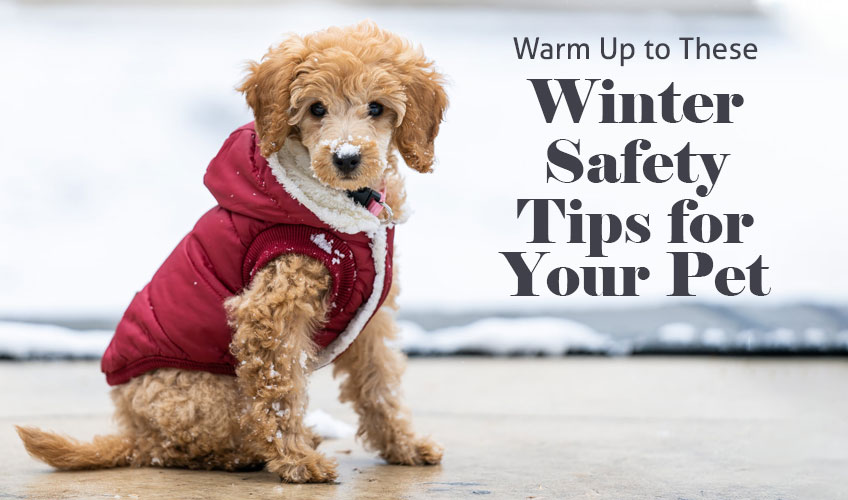As winter arrives, we can expect shorter days, longer nights, and the coldest temperatures of the year. But have no fear. When it comes to keeping your pet safe all winter long, you just need a little vigilance and a refresher. Lucky for you, we are happy to share our favorite winter safety tips to keep your pet safe and sound until spring arrives.
1. Silly Pet! That Antifreeze Isn’t for You.
One of the most common dangers pets face in winter is antifreeze and other winter-time poisons. To keep your pet safe, check where you park your vehicle to make sure that antifreeze isn’t leaking from your radiator. When you add antifreeze to your vehicle, be sure to wipe up drips or spills, as well.
Watch out for these other winter pet poisons:
Rodenticides
As rodents seek warmth and make their way into our abodes, homeowners put out rat poisons and rat traps. Both are dangerous for pets. In fact, your dog or cat may even become ill from consuming a rodent that consumed these poisons.
Ice Melts
While these may seem commonplace, they actually cause the most common wintertime woes pets can experience: diarrhea and upset stomach. Many pet parents don’t even realize their pet has become ill from lapping these chemicals off their paws. If a dog or cat ingests too much salt from ice melts, they can experience tremors, seizures, and ulcers around their mouths.
The good news is you can buy pet-friendly ice melts. And remember to always wipe off your pet’s paws before they come inside.
2. Make An Appointment for a Winter Check-Up
Bringing your pet in for an exam, as winter arrives, is a great idea. Because the winter weather can be ruff on dogs and impurrect for cats, the cold can exasperate underlying health conditions. Many common health conditions like heart disease, kidney disease, and diabetes can lower a pet’s cold tolerance. Additionally, arthritis can be a pain in the joints for pets during stints of cold. With a diagnosis and a quick chat, we can make the winter a bit warmer and easier on your pet.
We can also ensure your pet has all the meds they need to get through the winter–you may want to stock up in case of a storm.
3. Winterize Your Home for Your Pet’s Safety
Just like you winterize your car, you likely also change your home to make it comfier and cozier for winter. When it comes to space heaters, be sure they’re out of reach of your pet. Not only can pets knock them over, creating a fire hazard, but they can cause quite a startle and potential burn for pets. You can use a baby gate to fence them off or elevate them to keep them out of your dog’s reach.
You will also want to block off your fireplace and double-check that your carbon monoxide detector is working.
Keep extra food, water, and other supplies on hand in case of winter storms. Be prepared in case you get snowed-in or lose power.
We’re Here for You and Your Pet All Winter
Your pet’s health is our year-long priority. We can help you navigate your pet’s winter health needs and help you better understand how you can keep your pet active, safe, and healthy all winter long. Make an appointment to see us today!
Photo Credit: Pexels.

